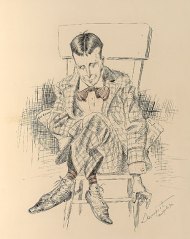Media myths often are pressed into the service of emphasis, to underscore telling points and broader themes about media performance.
So it is with the mythical tale about William Randolph Hearst’s vow to “furnish the war” with Spain at the end of the 19th century. The anecdote speaks to the arrogance and dangers of media power — that at their worst, the news media can even bring on war.
Which is nonsense.
Even so, “furnish the war” is a tale too tempting sometimes not to be pressed into the service of emphasis.
Which takes us to an essay posted today at the NPR’s online “You Must Read This” column, where writers discuss their favorite books. In the essay, Alexander Nazaryan of the “Page Views” blog of the New York Daily News pays tribute to Evelyn Waugh’s Scoop, a delicious send-up of war reporting that was published in 1938.
Sc![]() oop centers around William Boot, a hapless nature writer for the fictional London newspaper Daily Beast who inadvertently is assigned to cover the turmoil in Ishmaelia, a fictional state in East Africa.
oop centers around William Boot, a hapless nature writer for the fictional London newspaper Daily Beast who inadvertently is assigned to cover the turmoil in Ishmaelia, a fictional state in East Africa.
While slow to get going, Scoop offers hilarious turns. Its portraits of arrogant, suspicious, hype-prone war reporters are entertaining and resonate even today, 75 years on.
Why the NPR essay about Scoop much matters to Media Myth Alert is that it invokes the tale about “furnish the war.”
The essay notes how the bumbling Boot inevitably incurs the wrath of editors back in London, and adds:
“After filing the kind of stories that wouldn’t get a single retweet these days, he receives an unambiguous telegram from the Daily Beast: ‘LORD COPPER PERSONALLY REQUIRES VICTORIES.’ If that seems like rather heavy-handed satire, remember that the not-at-all-fictional Randolph William Hearst once allegedly told a correspondent in Cuba, ‘You furnish the pictures. I’ll furnish the war.'”
Actually, it’s not “Randolph William Hearst.”
And William Randolph Hearst almost certainly never sent a message vowing to “furnish the war.”
That anecdote revolves around a purported exchange of telegrams between Hearst and Frederic Remington, the famous American artist who in January 1897 went to Cuba for Hearst’s New York Journal.
Remington’s assignment was to draw sketches about Cuba’s rebellion against Spanish colonial rule. He was in Cuba six days, then returned to New York.
Before leaving, Remington supposedly wired Hearst, saying:
“Everything is quiet. There is no trouble here. There will be no war. I wish to return.”
In reply, Hearst supposedly said:
“Please remain. You furnish the pictures, and I’ll furnish the war.”
As I discuss in my 2010 book, Getting It Wrong, reasons for doubting the Remington-Hearst exchange are many, and include the absence of documentary evidence: The telegrams supposedly exchanged by Remington and Hearst have never turned up.
Moreover, Hearst denied ever having sent such a message, and Remington apparently never discussed it.
And the tale lives on despite an irreconcilable internal inconsistency: It would have been absurd for Hearst to have sent a message vowing to “furnish the war” because war— the Cuban rebellion against Spain’s colonial rule — was the reason Hearst dispatched Remington to Cuba in the first place.
“Anyone reading U.S. newspapers in early 1897 would have been well aware that Cuba was a theater of a nasty war,” I write in Getting It Wrong. “By then, the Cuban rebellion had reached island-wide proportion and not a single province had been pacified by Spain’s armed forces.”
The “furnish the war” anecdote first appeared in 1901, a brief passage in a slim memoir titled On the Great Highway: The Wanderings and Adventures of a Special Correspondent. The author was James Creelman, a portly, bearded, cigar-chomping journalist prone to hype and pomposity.
Creelman did not explain how or from whom he learned about the purported Remington-Hearst exchange. Creelman in January 1897 was Hearst’s correspondent in Europe, which means he wasn’t with Remington in Cuba, nor with Hearst in New York.
Creelman invoked the anecdote not to condemn Hearst, but to compliment him. For Creelman, the “furnish the war” vow was suggestive of the aggressive, anticipatory “yellow journalism” that he saw and liked in Hearst’s newspapers.
But in the mid- and late-1930s, the anecdote’s meaning shifted dramatically, to become emblematic of the supposedly wretched character of Hearst and his journalism.
The transformation made “furnish the war” a far more engaging tale, and ensured that it would live on and on. And ready to be pressed into the service of emphasis.
More from Media Myth Alert:
- Read Chapter One: Furnish the War
- William Randolph Hearst mostly elusive in new ‘Citizen Hearst’ documentary
- Hearst, agenda-setting, and war
- NPR revisits ‘crack baby’ panic, ignores media role
- Koppel goes on NPR, indulges in media myth
- PBS set to embrace ‘mass hysteria’ myth in anniversary show on ‘War of Worlds’?
- Watergate a Washington Post ‘scoop’? Not quite
- Obama’s ‘Cronkite Moment’? Salon dials up a media myth
- ‘Strategy for peace’ and blocking the schoolhouse door: Recalling a crowded week in June 1963
- ‘Persuasive and entertaining’: WSJ reviews ‘Getting It Wrong’


[…] his “Writer’s Almanac” podcast that airs on NPR, Garrison Keillor blithely retold the hoary media myth of William Randolph Hearst’s vow to […]
[…] the insurgents. The intended rendezvous never happened, but the assignment did give rise to the apocryphal tale of Hearst’s vowing to Remington that he would “furnish the war” with […]
[…] 1898,” Keillor told listeners of his “Writer’s Almanac” podcast that airs on NPR, “Hearst sent the artist Frederic Remington to Cuba to cover the war. And Remington wrote home, […]